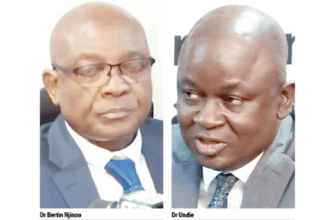H IGH blood pressure or hypertension is a common condition that develops over many years, affecting nearly everyone eventually. In 2008, the World Health Organisation (WHO) estimated hypertension prevalence of 42.8 per cent in Nigeria. It is considered one of the “Silent Killers” because hypertension may show no symptoms in the early stages. Often, most people find out they have high blood pressure during a routine medical checkups.
Now, experts are laying emphasis on people checking their blood pressure also at night and not relying on blood pressure monitoring in the doctor’s office to rule out spikes in their blood pressure while sleeping, a condition called nocturnal hypertension that can have potentially deadly consequences.
Spikes in blood pressure while sleeping are dangerous and difficult to catch as routine blood pressure checks are usually done during daytime. But individuals who have high blood pressure at night have a higher risk of developing heart failure, stroke and other forms of cardiovascular disease.
Nocturnal hypertension can also take place in people who have had a normal reading of blood pressure during the day, which makes it all the more important to understand the difference between the two. Even people whose daytime blood pressure is normal can experience nocturnal hypertension.
There have been many debates regarding the importance of daytime and nighttime blood pressure readings. Researches that reported on daytime and nighttime blood pressure separately found that both forms of blood pressure readings carried significant prognostic information in patients with hypertension.
Now, in a new study, researchers highlighted the importance of including nighttime blood pressure monitoring in patient-management strategies because higher blood pressure readings asleep could be an indication of a higher risk of heart disease and other forms of cardiovascular disease.
For the study, Japanese researchers studied 6,359 people, using wearable monitors to measure both daytime and nighttime blood pressure. It was published in the journal Circulation.
The participants all had at least one cardiovascular risk factor, and most were taking medication to control their blood pressure. However, none had symptomatic cardiovascular disease when the study started.
During two-year to seven-year follow-ups of the participants, researchers said they found those who had nighttime systolic blood pressure that was 20 millimeters of mercury (mmHg) above their daytime systolic reading were significantly more likely to experience atherosclerotic cardiovascular disease and heart failure.
The blood pressure is measured in two numbers: the top systolic blood pressure measures the force pushing against artery walls when the heart is contracting. The bottom diastolic blood pressure measures pressure in the arteries when the heart is resting between beats.
The researchers also found that disrupted circadian blood pressure rhythm (riser pattern, nighttime blood pressure higher than daytime blood pressure) was linked with higher overall cardiovascular disease risk, especially heart failure, compared with normal circadian rhythm.
Overall, study participants experienced a total of 306 cardiovascular events, including 119 strokes, 99 diagnoses of coronary artery disease, and 88 diagnoses of heart failure. Conversely, participants whose blood pressure was controlled with medication had an increased risk of stroke if their blood pressure dipped too low at night.
Dr. Yemi Raji, a hypertension expert at the University College Hospital (UCH), Ibadan, Oyo State, said knowing the blood pressure range over a 24-hour period is very good because blood pressure could vary all through the day and night period.
According to him, “it can be fine in the morning and when it is checked at night, it is high. So, a 24-hour monitoring machine can tell which time of the day the blood pressure is high. It provides a more accurate picture of blood pressure changes over an average day and night.”
Blood pressure has a daily pattern. Blood pressure is normally lower at night while sleeping. The blood pressure starts to rise a few hours before waking up. The blood pressure continues to rise during the day, usually peaking in the middle of the afternoon. Then in the late afternoon and evening, the blood pressure begins dropping again.
Dr Raji, however, declared that blood pressure should naturally dip or lowers at night, while resting and sleeping but if it doesn’t, and remains consistently high, that ends up putting the individual at an increased risk of heart attacks and strokes.
According to him, “Some people will do that well, but some won’t. Those that don’t do it well are called non-dippers. When such individuals wake up in the morning, their blood pressure is higher. Non-dippers have higher risk of developing cardiovascular events like stroke, heart failure, and heart attack. But in order to know who is a dipper or a non-dipper, one will need to do a 24-hour blood pressure monitoring.”
In healthy subjects, night-time blood pressure decreases by 10 per cent to 20 per cent of daytime blood pressure (normal dipper pattern).
Meanwhile, Dr Kazuomi Kario, the lead author of the study and a professor of cardiovascular medicine at Jichi Medical University in Tochigi, Japan, stated that nighttime systolic blood pressure was a significant, independent risk factor for cardiovascular events.
He added: “The study highlights the importance of including nighttime blood pressure monitoring in patient-management strategies and will hopefully encourage physicians to ensure that antihypertensive therapy is effectively lowering blood pressure throughout the 24-hour dosing period.”
Meanwhile, some experts ask that blood pressure medication be taken at night due to nocturnal blood pressure. Taking blood pressure medication in the evening improves blood pressure throughout the night and day, and reduces mortality overall. However, they suggested ruling out other things that contribute to increased nocturnal blood pressure.
Sleep apnea, medical conditions such as diabetes, thyroid, and kidney problems as well as poor sleep quality may also contribute to increase nocturnal blood pressure.
Poor sleeping habits include drinking caffeine or alcohol later in the day, napping during the day, non-consistent bedtime, poorly controlled sugar, exercising too late in the evening or emotional confrontations.
Having regular sleeping patterns, taking blood pressure medication in the evening as well as limiting salt intake can help to lower hypertension throughout the day and night, and can control high blood pressure while reducing mortality overall.
Here are a few tips to lower blood pressure naturally:
- Exercise regularly and increase activity level, focusing on the ones that raise the heart and breathing rates.
- Lose weight if overweight, losing even five to 10 pounds can lower the risk of high blood pressure.
- Restrict the intake of sugar and refined carbohydrates, which can help to lose weight and lower blood pressure.
- Eat a diet rich in fresh fruits, vegetables, whole grains and low-fat dairy products.
- Stop smoking and manage stress, which is important for blood pressure and overall health. Also, limit alcohol intake. Drinking too much can increase blood pressure.
YOU SHOULD NOT MISS THESE HEADLINES FROM NIGERIAN TRIBUNE
ICYMI: Nigeria Back Into Recession, Worst Since 1987
Nigeria is back into a recession. This time, it is the worst the country has experienced since 1987…
ICYMI: Why We Can’t Call Off Strike Now –ASUU
It is still uncertain whether the ongoing strike by the Academic Staff Union of Universities (ASUU) will end soon as the president of the union, Professor ‘Biodun Ogunyemi has said there are certain steps to be taken to reach a final conclusion on the issue…






